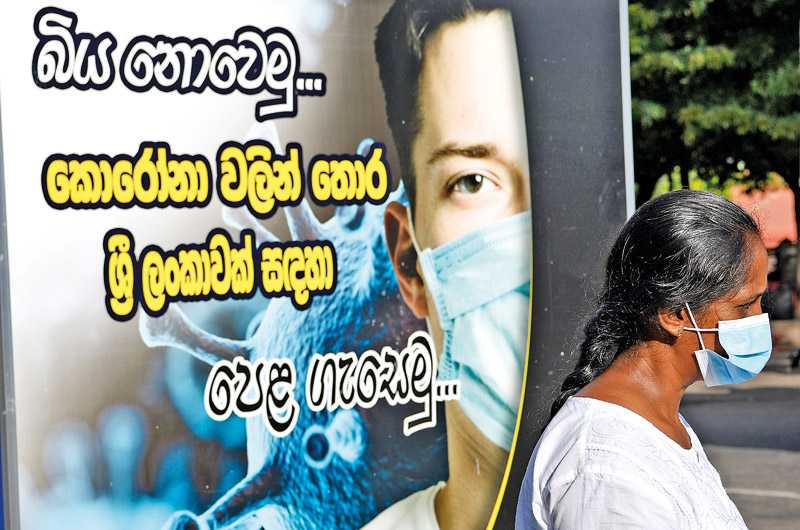Saturday Feb 21, 2026
Saturday Feb 21, 2026
Thursday, 26 November 2020 00:15 - - {{hitsCtrl.values.hits}}

As a vaccine is about to hit the skin, the world may be yearning for normalcy. The virus has changed the way we live for many months. It should have opened up our minds too and that is what makes a winner at the end. We have to ensure that it will not extract a heavy toll from us and that we come out stronger – Pic by Shehan Gunasekara
 Leapfrogging is a favourite action word we usually use to indicate the desire to move ahead with little bit of speed and jump disregarding the normal to get ahead of the curve, etc. Most of the time in our minds hearing the word may conjure up something big being planned or expected. These days there is no normal situation but only plenty of issues in a highly dynamic setting.
Leapfrogging is a favourite action word we usually use to indicate the desire to move ahead with little bit of speed and jump disregarding the normal to get ahead of the curve, etc. Most of the time in our minds hearing the word may conjure up something big being planned or expected. These days there is no normal situation but only plenty of issues in a highly dynamic setting.
While the virus is displaying the power of the exponential, being a step ahead is complicated. The relationship between two subjects, epidemiology and economics, and perhaps more between the practitioners could be quite testing. Within the dynamics of this situation and its management so much understanding and awareness has to be present.
The knowledge and experience required as we move on with the second wave is significantly different from the first wave and the virus too had mutated with time. Of course the situation perhaps was made complicated by what we did not do between the first and the second. This is where the attitude and outlook cannot be like frogs in the well if one is to succeed! There is a responsibility by many in ensuring that we move ahead instead of getting stuck in a state of complacency or bickering. Old answers are definitely not solutions to the current crop of problems.
COVID-19 is seriously challenging all of us
COVID-19 is seriously challenging all of us. We may not indicate all the data and one good reason for that situation is we do not know all the data and what you do not know you cannot tell! However overall we may have numbers and some may actually be coming from a wish list. A fact that we cannot ignore is the necessity of taking decisions with long term in mind yet managing the short term well.
Across the world COVID-19 is playing havoc and many surely are seriously suffering. However the approach in resolving issues is definitely going to separate winners and losers on a global platform, of course aided and abetted by the virus. As we write we have two candidate vaccines having demonstrated over 90% efficacy. One is by a well-established company and the other a start-up from a University. For the moment the better data though marginally has come from the start up. Coming this far within this timeframe is actually a success considering the typical vaccine development time scales mooted at the initial stages of the pandemic. A third generating vaccine development mechanism has been used utilising advanced technology. There, however, a challenge still awaits of scaling up production and logistics of getting the vaccine to the billions.
Another observation is the parallel development of factories with the manufacturing methods while the vaccine was under development, which are also a novelty and not the usual manner of development. These steps have dramatically cut down on the established times for vaccine development. Of course some say the head start for the COVID-19 vaccine was actually given by the work coming from the SARS era.
Another development, the Russian vaccine, even went on to name their vaccine as Sputnik as a reminder to the world on their technological prowess. In innovation literature we have the term Sputnik moment – a reminder to one nation to act fast in the face of strides made by another. This was the situation that developed in the space race between Soviet Union and United States.
Sri Lanka must understand the Sputnik moment
Sri Lanka too must understand the Sputnik moment. As I indicated in the last column while the country has suffered a precipitous drop in the global innovation ranking the neighbour India has climbed up to be in the top 50. China is well up on the ladder. The use of science and technology has been a characteristic of both these nations.
China of course did a crash course in S&T engagement and the growth acceleration has been remarkable. While many were seeing a serious drop in economic performance of China due to COVID-19 it has demonstrated to be one country with decent growth numbers at present. Many others are tottering having to display embarrassingly negative economic numbers. We ourselves have not released immediate figures and postponed communications to the year-end. Hong Kong is showing how they are running the system with technology and discipline coupled together.
Across many countries the second wave management is showing distinct differences from the first. Some countries are of course buoyed by the fact that they are leaders in the race for the vaccine. Of course some methods deployed in management definitely invades on privacy and releases so much data of oneself to the outside. The virus has accelerated some segments of technologies to dominance. Zoom, another startup, has accelerated to have a value almost twice the GDP of Sri Lanka. Zoom is almost becoming the synonym for a virtual meeting!
Science and tech to the fore
Delivery of food, accessing medicine and education are still critical issues for us. For some the technology has aided well. However for many the benefits of technology are still outside their reach. There is a need to understand and plan early to ensure that the vaccine becoming available at some point in future becoming accessible to the critical group of personnel quickly. WHO may support but the infrastructure needs have to be set up from within.
We know that the two most promising candidate vaccines do require a cold chain facility with quite a low temperature – an infrastructure that we do not have. The Oxford University vaccine, which has been developed with the classical development pathway, does give us a chance with the existing facilities.
A country that has shown strength starting much later – Vietnam – developed antigen testing at an early stage of COVID-19. There is a serious need to consider why within our economy and system such developments are not possible. We also have to reflect why only controversy usually surrounds whenever something different is happening or mooted. From smart ID, Wi-Fi to antigen test kits it is not science that gets discussed or lead the situation in our country but polarised exchanges.
This crisis is requesting us to understand the Sputnik moment. Many economies are simply moving past us. We cannot leapfrog by tinkering on old principles of economics. Paul Romer, the most recent Nobel Prize winner on economics, has been credited with his theory of endogenous economic growth from technology innovations. He has followed his theory from the 1987 Nobel economics laureate Robert Solow who won his prize for espousing the role of technology developed with R&D investments for making United States for what it is.
These concepts, which are finding place in many minds outside, are quite visible for having no effect in local minds. In the economic parlance the usual way of looking at leapfrogging was to enable small and incremental innovations. What was considered was if an organisation continues to engage in such that such effort would be sufficient to keep the organisation ahead of its competitors. However this is not right today.
Incrementalism is useful but not forever. The disruption from innovation is almost always around the corner. Over decades this possibility has been shown. Also over the same decades the divergence power of technology too had been amply demonstrated and that is why we have situations like climate change on us. Therein lies the importance of opening up and understanding from all available opportunities and ensuring that your actions are well thought of and evidence based.
The economy in moving forward needs investments in areas that we have been shy for most of the time. Our expenditure on R&D as a percentage of GDP has been falling since independence. Our investments to ensure that ideas reach market had been almost invisible. We have worked quite hard to ensure that outside ideas reach our market! We must understand the strong need for the manufacturing sector to grow. Fortunately the Budget presented has articulated that. This is a vital sector that needs to come out of the state of doldrums that it is in.
Leapfrog and emerge stronger
Leapfrogging required here is the quick action in ensuring that the poor technology base in most of our economic segments is rapidly reversed through the adoption of modern systems without going through any intermediate steps. Easier said than done but we have to ask ourselves a question – is there another way? I am sure the answer from Paul would be NO!
It is instructive to observe in a critical situation how industry responded in USA. President Franklin Roosevelt gave pre-WWII American industry a request to produce more than 10 times the rate than ever done before. The request was 10 times and President’s comment upon getting the feedback of cannot do was that the American industry would find a way… and they did and set new benchmarks in the process. This drive, the response is needed today within our system too.
As a vaccine is about to hit the skin the world may be yearning for normalcy. The virus has changed the way we live for many months. It should have opened up our minds too and that is what makes a winner at the end. We have to ensure that it wil lnot extract a heavy toll from us and that we will come out stronger.